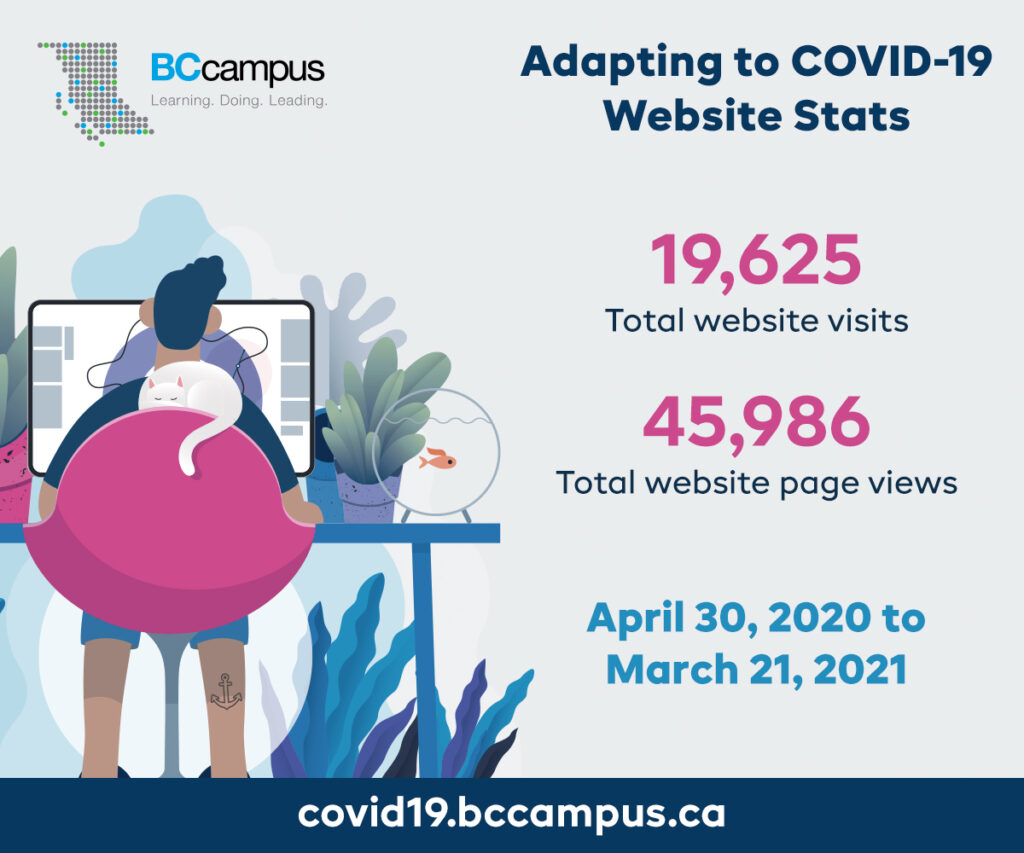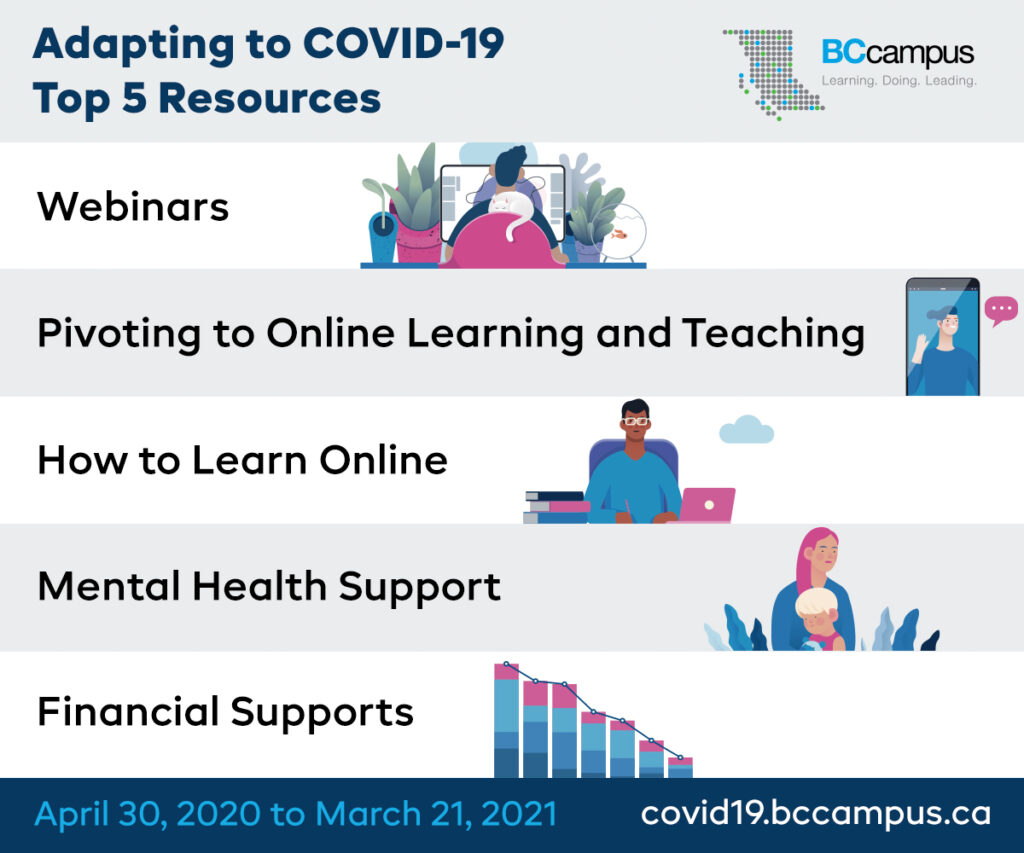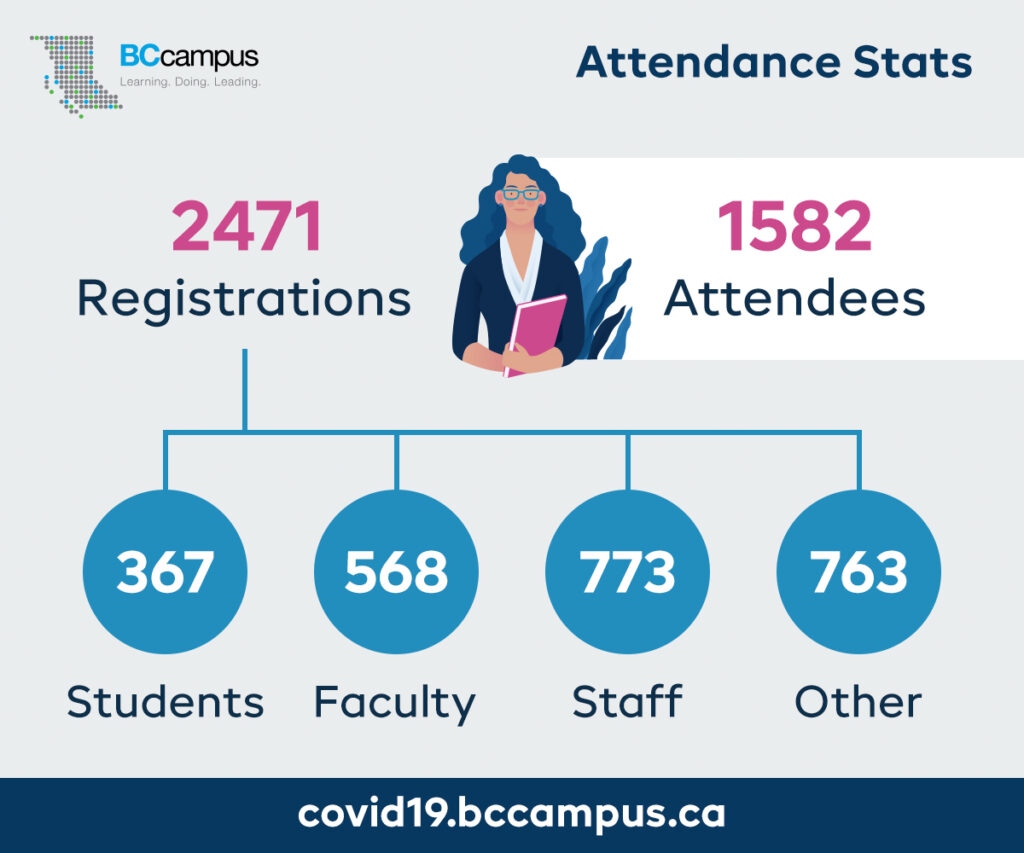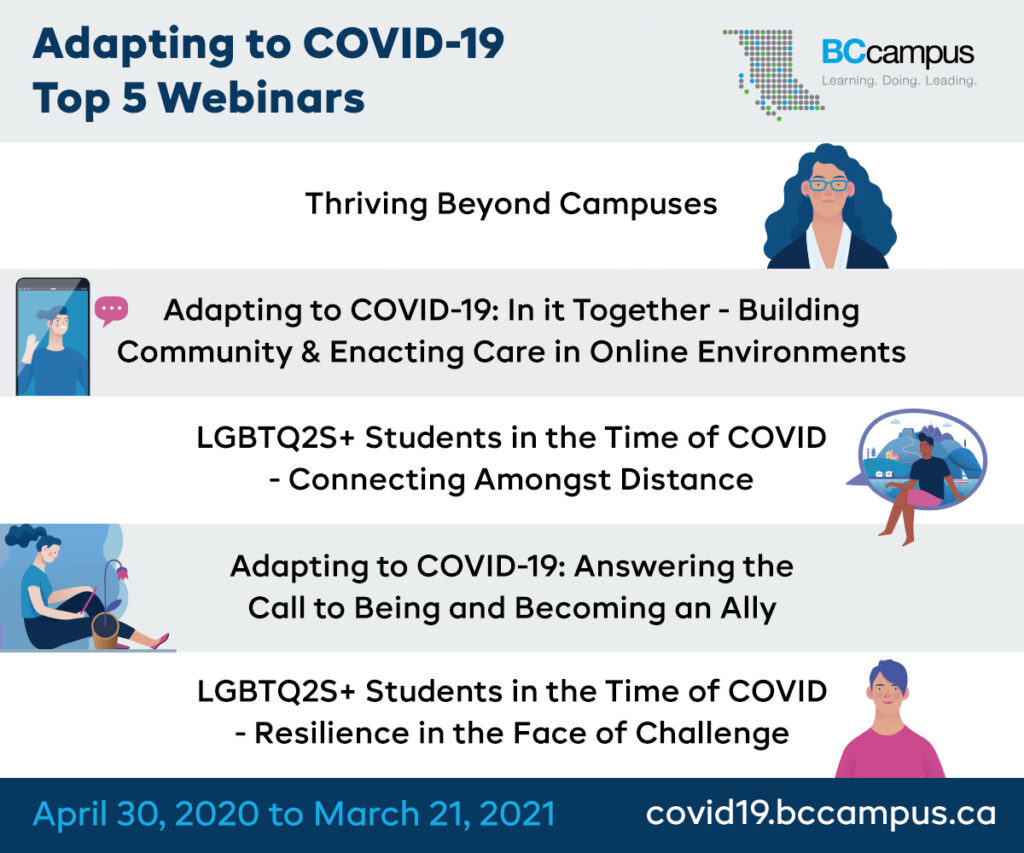As the pandemic ramped up in the spring of 2020, BCcampus launched an online repository for students, staff, and faculty throughout the province, offering support and resources to help with mental health concerns, financial relief, safety, personal rights, and the pivot to online learning and teaching.
Post by the BCcampus editorial team
Much like most institutions and organizations in the early days of COVID-19, we had no idea how long the pandemic would last and how we should prepare for the future. The reports from media and political voices were often contradictory, ranging from “It’s going to disappear. One day, it’s like a miracle, it will disappear,” according to a former U.S. president, to “calculations based on the CDC’s scenarios suggested, 2.4 million to 21 million people in the United States could require hospitalization, potentially crushing the nation’s medical system,” via the New York Times. Nobody knew what the days, weeks, and months would bring, so when the Ministry of Advanced Education and Skills Training asked us to create a resource to help the students, staff, and faculty in B.C., we recognized the opportunity and quickly assembled a website to cover many relevant topics.
Rich with Resources

The intention for the new website was to create a single repository of support and resources: a place where anyone connected to post-secondary education in B.C. could go to learn about ways in which the novel coronavirus might impact their work, home, or school life. The first iteration of the site launched with information and resources regarding mental health support, financial relief, controlling the spread of COVID-19, ways to stay safe, and human rights, as well as academic accommodations, international student concerns, and victim services. Through an iterative approach, we continued to add new content as we became aware of it, which helped the new site become a go-to space for many of the people of B.C., whether they were connected to post-secondary education or not.
Working Through the Pandemic
Due to the substantial adoption of our COVID-19 website, we were able to share additional opportunities far and wide. Through special events, such as frequent webinars, we were able to quickly and effectively connect with learners and educators across the province to find out where they needed help. These sessions and the consultation process we used to facilitate them provided an opportunity for folks in the sector to connect and share ideas, hear what other people were going through, and emphasize that they were not alone through this experience.

These online events focused on coping with COVID-19 through mindful practice, with strategies to deal with anxiety, and diversity and inclusion. We also hosted sessions around allyship, adapting to the challenges facing international learners and supporting LGBTQ2S+ students in the time of COVID. As well, we had events aimed at simply having fun and enjoying each other, like the Bhangra dance sessions with Gurdeep Pandher. Recognizing that these webinars needed to support a diverse group of folks across the sector, we were intentional with the representation of our facilitators to be as inclusive as possible. Throughout the consultation of this project, we leaned heavily on consultants, such as Duane Seibel from DKS Consulting, along with many subject-matter experts and student association leaders in the B.C. post-secondary sector. A real sense of community developed over the duration of this project that played a huge role in shaping the content over the past several months.

“There were so many great webinars that came to being through this website,” said Robynne Devine, project manager at BCcampus. “This was due to the immense expertise and willingness to contribute from educators across the province throughout the project.”
Partnerships
Through our consultation process, we learned that students needed more support with online learning. Thankfully the University of British Columbia’s Chapman Learning Commons opened its Learning Skills Workshops for students across the province, resulting in 231 responses in the first weekend. The goal of this collaboration was to provide students essential skills to learn online, in response to the sudden pivot to online learning.
We partnered with Simon Fraser University and the University of British Columbia to deliver a cohosted four-part dialogue series, Thriving Beyond Campuses, connecting B.C. post-secondary institutions to explore topics like the impact of mental health bandwidth depletion, cognitive bandwidth concerns, and ways to enhance student well-being in learning environments.
To wrap up the Adapting to COVID-19 webinars, we collaborated with Healthy Minds | Healthy Campuses (HM|HC), a province-wide community of practice that promotes mental wellness and healthier relationships with substances. The Summit offered a series of webinars from February 22 to 25 focused on mental well-being and healthy relationships with substances on post-secondary institutions in British Columbia.

An Essential Project
The covid.bccampus.ca site will be maintained and available as long as it’s being used. Based on the analytics and feedback, we know that people are still visiting the site regularly, and although the project itself is coming to an end, we’ll keep the website up for as long as necessary. In the summer of 2021, we’ll review the traffic and speak to the community to see if the site is still needed. Once it has been officially decommissioned, the resources will be shared via our main site: BCcampus.ca.
Here2Talk
The COVID-19 website launched alongside the Here2Talk service, a free support resource offered to students currently registered with a B.C. post-secondary school. The site and app offer 24/7 support with experienced professionals and is free to students, with no appointment needed.
Notable Quote
“Government is also providing $275 000 to BCcampus to develop online resources and tools for students, staff and faculty to help them navigate a range of topics on well-being, which are needed now more than ever. Resources include a website, videos and webinars on topics such as adapting to online learning, building resilience, stress management and understanding financial supports.”
– Hon. Melanie Mark, former Minister of Advanced Education, Skills and Training
